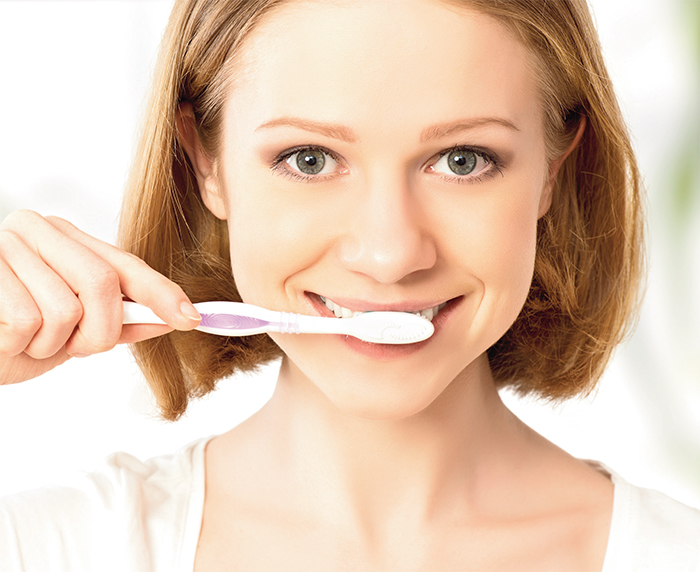Word of mouth
In Conditions
Follow this topic
Bookmark
Record learning outcomes
Brushing, flossing, rinsing €“ oral care should be a straightforward regimen, yet many customers are confused about how they and their families should care for their teeth. We talk to experts to answer some of the most common questions

Oral hygiene is a confusing topic, with many people being unaware of the correct brushing technique, as well as whether to use mouthwash, how to care for children's teeth, and the best diet for optimum oral health. €On a Saturday, I've hung around in a pharmacy and I'd say around one in six enquiries are dental questions,€ says Nairn Wilson, professor of dentistry at King's College London Dental Institute. €I feel very strongly that there is huge potential and a real opportunity for pharmacies to dispense oral care advice, and that pharmacists and dentists should work to maintain more of a relationship.€ Here, TM answers the questions that customers commonly ask for advice on€¦
What's the ideal daily oral health regimen?
Teeth should be brushed at least twice a day with fluoride toothpaste for approximately two minutes. This should include last thing at night and one other time during the day. €The main point to hammer home is brushing last thing at night,€ explains Professor Wilson. €A lot of people say 'I'm tired, I'm going to bed' €“ but you don't want that plaque circulating in your mouth while you sleep.€ All surfaces of the teeth should be brushed, including the inside, outside and chewing surfaces. After brushing, excess paste should be spat out, but the mouth should not be rinsed with water or mouthwash.
What's the correct technique for brushing teeth?
Professor Wilson recommends the following method:
- Angle the bristles of the brush towards the gum margin
- Use a 'jiggling' rather than scrubbing motion
- Adjust the angle of the brush as you work over the surface of the teeth
- Work systematically around the jaw from the upper to lower right, and the upper to lower left.
Do I need to floss?
If so, what's the best technique? Flossing €“ or interdental brushing €“ dislodges food that is wedged between teeth. Flossing may reduce gum disease and bad breath as it removes plaque that forms along the gum line. Advise customers to floss once a day, before brushing their teeth. They should take 30-45cm of floss or dental tape and grasp it so that a couple of inches are taut. Slip the floss between teeth and into the area between the teeth and gums as far as it will go. Floss with eight to 10 strokes, up and down to dislodge food and plaque
I feel very strongly that there is huge potential and a real opportunity for pharmacies to dispense oral care advice
Should I use mouthwash?
€Mouthwash isn't critical, but it can help in the removal of plaque,€ says Professor Wilson. €Mouthwash catches bits missed by brushing and contributes to mouth freshness.€ Fluoride mouthwash can help prevent tooth decay, but shouldn't be used immediately after brushing. Choose a different time, such as after lunch, and allow 30 minutes before eating or drinking.
What sort of toothbrush should I use?
€A power toothbrush is better than a manual,€ explains Professor Wilson. He also advises opting for a small-headed brush with a medium texture that allows manoeuvring over the different angles of the teeth without causing trauma to the gum tissue. However, either a manual or an electronic toothbrush is effective, providing all surfaces of the teeth are brushed with fluoride toothpaste.
How often should I replace my toothbrush?
€As soon as the bristles curl or lose their straightness and stop springing back,€ says Professor Wilson. This usually occurs after three months.
I often spit blood after brushing. What does this mean?
€Spitting blood is an early, classic sign of gum disease, which is otherwise often asymptomatic,€ explains Professor Wilson. €The margin of the gum tissue becomes inflamed and loses its firmness and coral-pink colour to become puffy and red.€ This occurs as a result of poor oral hygiene as the tissues that support the teeth become infected, usually due to bacteria from a build up of plaque. In more susceptible individuals, the body over-reacts to the bacteria around the gums and causes excessive inflammation. In more serious cases, the inflammation does not resolve properly and can enter the bloodstream, affecting the heart and brain.
Why do I have bad breath?
One in four UK adults regularly suffer from halitosis (bad breath), mostly caused by poor oral hygiene. €Hydrogen sulphide creates the odour that's released by decaying food debris on the surface of the tongue or between teeth,€ explains Professor Wilson. Pre-existing conditions such as dry mouth; diabetes; throat, nose or lung infections; and liver or kidney problems can also be culprits. Smoking, certain medication and strong smelling food can cause short-term bad breath. €Food creates more of a 'heavy' breath rather than bad breath,€ adds Professor Wilson. €Good hygiene should ensure you don't get heavy breath irrespective of diet.€ To prevent bad breath, teeth should be brushed twice daily and a brush or tongue scraper used to remove bacteria from the back of the tongue. Using an antibacterial mouthwash containing chlorhexidine or hydrogen peroxide can also be effective, as can chewing gum. €Chewing gum picks up debris and stimulates saliva €“ 'nature's toothpaste',€ says Professor Wilson. However, this it is not a substitute for proper oral hygiene. If bad breath persists, advise customers to keep a food diary to present to the dentist that also records any medication they are taking.

When fruit is juiced or blended, its sugars are released from their structure, which can damage teeth
Why are my teeth sensitive?
The outer layer of teeth is called enamel, which is an extremely hard and durable substance. Underneath the enamel is the dentine layer, a softer tissue, and at the centre of the teeth is the pulp, which contains blood vessels and nerves. People who smoke or have poor oral hygiene are more prone to gum disease and receding gums, which exposes the dentine layer. This exposure causes a short, sharp shock when eating something very cold, hot or spicy.
Sensitive teeth could also be caused by tooth decay; a cracked, chipped or worn tooth; frequent consumption of acidic drinks; incorrect brushing technique, and using an abrasive toothbrush or paste, which can all lead to enamel loss. Firstly, advise customers to visit a dentist to ensure there's no serious underlying cause. Sensitive toothpastes can help to reduce symptoms, but Professor Wilson insists they're €not a magic bullet€ and sensitivity can persist or recur. €With diligent use and professional support, they should be effective, but once gums start to recede, that process can't be reversed,€ he adds.
Common complaints
Mouth ulcers
What are they? Painful, round sores in the mouth, often inside the cheeks or lips.
Treatment: They usually clear up within 10 to 14 days. A corticosteroid mouthwash or spray may reduce inflammation. An antimicrobial mouthwash, gel or spray may help kill pathogens that could infect the ulcer.
Cold sores
What are they? Small, fluid-filled blisters around the mouth.
Treatment: Cold sores usually clear up within seven to 10 days. OTC antiviral creams can ease symptoms and aid healing if applied early (i.e. during the tingling phase). Cold sore patches containing hydrocolloid gel may also be effective. Antiviral tablets may be prescribed in severe cases.
Dry mouth
What is it? Age, smoking, anxiety, certain medication (e.g. antidepressants), or a pre-existing condition (e.g. Sjogren's syndrome) can also mean that the body doesn't produce enough saliva, which can cause dry mouth.
Treatment: An oral rinse formulated to restore mouth moisture or an OTC artificial saliva substitute can be recommended. In severe cases, pilocarpine hydrochloride may be prescribed to stimulate saliva production. Also advise customers to suck on sugar-free sweets, chew sugar-free gum, stay hydrated, quit smoking and avoid mouthwashes containing alcohol or peroxide.
How do you care for children's teeth?
Children under six years old without any tooth decay should use a children's toothpaste containing at least 1,000ppm fluoride. Children younger than three should use just a smear of toothpaste and those aged three to six should use a pea-sized amount. Adults and children aged seven and over should use a toothpaste containing 1,350- 1,500ppm fluoride. Children should be supervised when brushing their teeth up to the age of seven to ensure the correct technique is used and that they do not swallow toothpaste.
Why brush baby teeth when they fall out anyway?
€Baby teeth determine the growth and development of the jaw, and ensure positioning of the permanent teeth,€ explains Professor Wilson. €Teaching children [while they're] young the correct brushing technique is a skill they'll take with them throughout their life.€ A baby's teeth should be brushed with fluoride toothpaste as soon as the first milk tooth appears (around six months old). €Start brushing baby teeth the minute one comes through,€ says Professor Wilson. €Introduce a baby toothbrush with a soft head and a toothpaste with a low fluoride concentration.€ Babies should be taken to the dentist so that they become familiar with the environment. This also allows potential problems to be identified early.

A child's milk or first teeth determine the growth and development of the jaw and ensure positioning of permanent or adult teeth
How often should I visit the dentist?
€It very much depends on the individual and their needs,€ explains Professor Wilson. Check ups allow dentists to identify any problems and ensure the mouth remains healthy. Leaving problems untreated can cause them to worsen so it's best to treat them early, or €“ better still €“ avoid them altogether. A dentist will suggest how often an individual requires a check up, which can be as regularly as every three months or as infrequently as two years (one year if younger than 18 years of age). €If you've established and maintained a good oral health routine and the dentist is confident you'll look after your teeth then they may advise you to go once a year,€ says Professor Wilson. Some people, such as pregnant women, chemotherapy patients or those taking certain medication, may require more frequent consultations.
Should I brush my teeth before or after breakfast?
There's no straight answer €“ it depends on what you're eating. €If it's largely fruit and fruit juice that has a high acid content, you shouldn't brush after eating because the acid softens the top surface of the teeth,€ explains Professor Wilson. €If you have a milk-based breakfast or porridge, it's better to brush after.€
Should I whiten my teeth at home?
Teeth whitening involves bleaching teeth to make them several shades lighter, while whitening toothpastes reduce surface staining. Teeth whitening is a form of dentistry and can require multiple visits to the dentist over several months, depending on the treatment. Such practices should only be performed by a dentist or a regulated dental professional, such as a hygienist or therapist, on the prescription of a dentist. Teeth whitening isn't permanent and usually lasts between three months to three years. Advise customers that some DIY whitening kits can carry risks and are not going to be as effective as a visit to the dentist for professional whitening. Whitening toothpastes, however, can help to remove surface stains.
Should I quit smoking?
€Firstly, smoking stains teeth,€ explains Professor Wilson. €It can also lead to halitosis and can aggravate gum disease, worsen gum recession and very substantially increase the risk of oral cancer.€ People who smoke more than 20 cigarettes a day are six times more likely to develop mouth cancer than non-smokers. And the risk increases when combined with heavy drinking to 38 times more likely than people who neither drink nor smoke. Alcohol can also erode the outer surface of the teeth, leading to a loss of enamel.
What should I be eating?
Sugars occur naturally in fruit and dairy products, so these should be avoided before bed, when saliva flow is reduced. €Fruit is fine if it's part of a meal, but try to finish a meal with something neutral like cheese€, says Professor Wilson. Dried fruit is a concentrated source of sugar and can stick to teeth so should be eaten sparingly. Only have sweets as an occasional treat and don't offer them to children as a reward. Fizzy drinks, including diet options and carbonated water, contain acids that can erode the outer surface of teeth. When fruit is juiced or blended, its sugars are released from their structure, which can also damage teeth. Drink no more than 150ml of unsweetened fruit juice a day and only with meals.
Heart in the mouth?
People with gum disease have a higher rate of coronary heart disease (CHD). However, why this occurs is not fully understood. One theory suggests a direct biological link €“ gum inflammation affects the build up of plaque in the coronary arteries. Alternatively, it may be lifestyle related €“ smoking and a poor diet contribute to both gum disease and CHD.
€One thing we can confidently say is that having gum disease increases the risk of endocarditis,€ says Christopher Allen, senior cardiac nurse at the British Heart Foundation. €Endocarditis is where the inner lining of the heart becomes infected. This can lead to severe deterioration in the function of the heart valves and the heart muscle can become less efficient at pumping blood around the body.€
Regardless of whether there is a direct link or not, maintaining both oral and heart health is critical. €The good news is that gum disease can usually be treated quite successfully and easily by good oral hygiene practice and sometimes medication,€ says Christopher. €CHD, once it has developed, is irreversible.€ Christopher's advice is that people can minimise their risk of developing CHD by living a healthy lifestyle, including not smoking and staying active.
